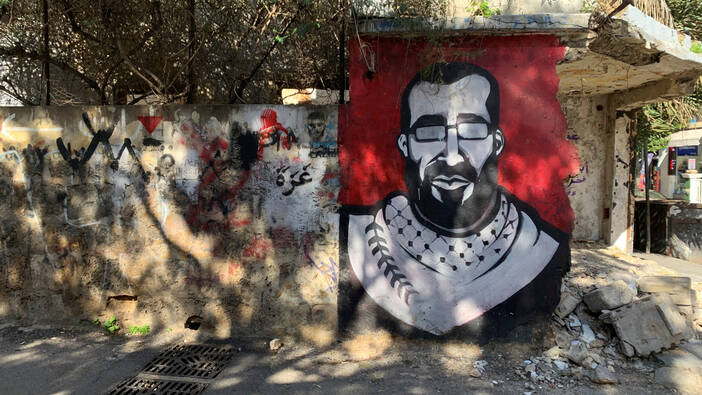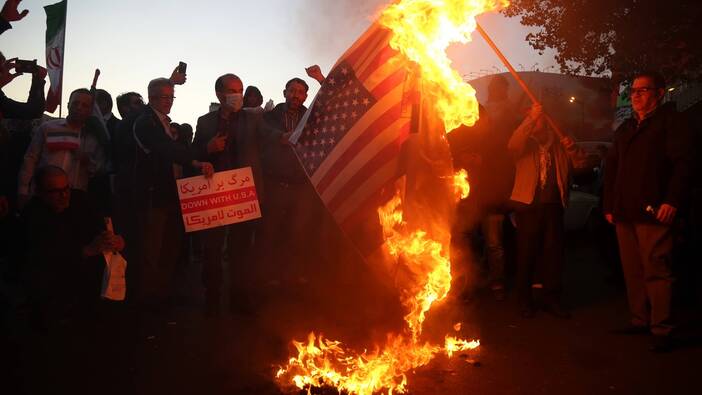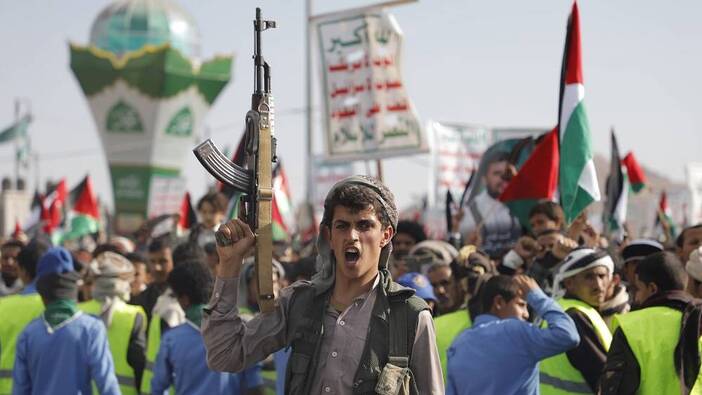
Recent coverage of Lebanon tends to focus on the conflict between the Hezbollah militia and Israeli forces. The Hamas-led attack on Israel on 7 October 2023 had an immediate impact on Lebanon: just one day later, in the early morning of 8 October 2023, the Shia militia began launching strikes on northern Israel. An Israeli counterstrike came not long thereafter, when Israeli Defence Forces fired on a Hezbollah military base in southern Lebanon. The target of Hezbollah’s attack was an Israeli outpost in the Shebaa Farms area, which Hezbollah claims is Lebanese territory occupied by Israel.
Christina Förch Saab has lived in Lebanon for 24 years. She reported for Deutsche Well in the 2000s, and has worked for various German-language news outlets ever since.
Hezbollah and Israeli forces have clashed daily ever since. According to the International Organization for Migration (IOM), 92,000 Lebanese people fled the border region for other parts of the country farther north, to escape Israel bombing in towns and villages in southern Lebanon. Civilians in northern Israel, on the other hand, have been evacuated from their homes due to regular Hezbollah bombing.
The Lebanese government has not endorsed Hezbollah’s decision to strike northern Israel in a “show of solidarity” with Hamas after the 7 October attack. The population is divided. Lebanon’s caretaker prime minister, Najib Mikati, emphasized his lack of control over the Shia militia, making him a passive observer of the war that has now gripped southern Lebanon for seven months. Yet he has little leeway to criticize Hezbollah’s military activities, since it was a Hezbollah-backed political alliance that lifted him to office.
More than 300 Hezbollah soldiers have been killed in action to date — including high-ranking officers. The numbers are climbing daily. Some 50 civilians, aid workers, and journalists are also among the victims. Israeli forces have also carried out isolated strikes in other parts of the country — the Baalbek region and Dahieh, a southern suburb of Beirut — killing important militiamen. On the Israeli side, 18 soldiers and 10 civilians have been killed to date. Hezbollah attacks have been limited primarily to military bases. The evacuation of citizens from towns and villages in northern Israel has led to fewer civilian casualties there compared to in Lebanon, where neither Hezbollah nor the Lebanese government have made an effort to remove people from conflict areas.
A minor miscalculation could be enough to escalate the situation.
For citizens in other parts of the country and above all in the capital, Beirut, the southern war is barely noticeable. People go about their work and everyday lives. The daily buzzing of Israeli drones circling over the capital gets lost in the noise of traffic. Israeli fighter jets occasionally fly over Beirut. Nevertheless, despite the appearance of everyday normality, the threat of a Hezbollah–Israel war that could spread across the entire country looms large over the Cedar Republic. Many Lebanese people are tense and live in a state of constant anxiety and insecurity. They feel powerless. Should war break out, only those with adequate means would be able to relocate to other, safer parts of the country.
Even if Hezbollah has hitherto refrained from expanding their war efforts, the possibility of escalation is real. A minor miscalculation could be enough to escalate the situation: one military strike too many — on a high-ranking Hezbollah leader, or an important officer in the Israeli Defence Forces, for example. The consequences would be difficult to control.
The Origins of Hezbollah
Hezbollah was established in the 1980s and has received political, financial, and military support from the Iranian regime ever since. The Shia militia presents itself as a resistance group against Israel. Hezbollah fought in Israeli-occupied southern Lebanon until May 2000, when the Israeli army withdrew. The militia has since developed into an increasingly dominant political and social force in Lebanon, with a strong military grip and an immense arsenal of weapons that even exceeds that of the Lebanese army.
Between billions in funding from Iran, corruption, and smuggling, Hezbollah has managed to acquire tremendous wealth, which in turn has enabled the organization to build a network of social and economic institutions that provide for the Shia population: cheap goods and jobs but also schools and hospitals. They have long since succeeded in creating a state within the state, and by providing extensive services have also gained the Shia population’s support.
A brief, intense war between Hezbollah and Israel in July 2006 devastated southern Lebanon and the Hezbollah stronghold of Dahieh, a Beirut suburb. Important infrastructure including Beirut airport runways, along with bridges and highways, was destroyed.
Since then, Hezbollah’s military wing has focused on other countries, providing military support to the Syrian dictator Bashar al-Assad and the Houthi rebels in Yemen, for example. Hezbollah’s core ideology — resisting Israel — increasingly fell from view. The war in Gaza is thus a welcome opportunity for the “party of Allah” to re-cement its position as a powerful resistance organization against the threat represented by Israel. But what about the other political parties — Hezbollah’s allies as well as its opponents? Does Hezbollah’s military engagement against Israel threaten to destabilize domestic politics in Lebanon?
Hezbollah’s Allies
In the 2000s, Hezbollah’s political wing entered into alliances with a range of parties. For years, Hezbollah’s allies have included the Syrian nationalist party, which has close ties to Bashar al-Assad’s regime in Syria, the Christian Free Patriotic Movement founded by former Lebanese President Michel Aoun, and the Shia Amal Movement party associated with Nabih Berri, speaker of the Lebanese parliament since 1992.
Opposed to Hezbollah is an alliance comprising the Future Movement party, formed by former Prime Minister Rafic Hariri, who was murdered in 2005, Kataeb, led by Sami Gemayel, and the Lebanese Forces, headed by Samir Geagea (both Christian parties), as well as Druze leader Walid Jumblatt’s Progressive Socialist Party.
Both of these large political coalitions have repeatedly managed to form unity governments; they also united against the 13 opposition candidates who were elected to parliament in May 2022 — all participants of the 2019 protest movement, when people took to the streets en masse to protest government corruption. Left-wing parties such as the Lebanese Communist Party hardly play a role, since they currently have no representatives in parliament.
Hezbollah’s military actions against Israel are largely detached from any internal political process.
This precarious political framework is now in danger of shifting as a result of Hezbollah’s military activities against Israel, and the Sunni Prime minister Najib Mikati has warned Hezbollah leader Hassan Nasrallah against expanding the war. The Christian Maronite Patriarch Boutros al-Rai — a significant authority for Lebanese Christians in the confessional system — has also called for restraint.
Christians in southern Lebanon feel like they are at Hezbollah’s mercy, and do not support the war. The Lebanese Forces have been campaigning since November with billboards and social media posts resolutely rejecting the idea of a new war in Lebanon. Even Gebran Bassil, leader of the Free Patriotic Movement and long-time Hezbollah ally, has increasingly criticized Hezbollah’s military actions against Israel.
The old political coalitions have also been shaken up by the war in Gaza and Hezbollah’s response. Political support for Hezbollah is waning. According to an October 2023 survey conducted by Statistics Lebanon, 73 percent of Lebanese people are in favour of avoiding a war with Israel. This includes the Shias from southern Lebanon, as well as the majority of Shias, Christians, and Druze.
Iran’s Influence
What a majority of political leaders and Lebanese citizens want, however, is of little relevance: Hezbollah’s military actions against Israel are largely detached from any internal political process. The heavily armed Shia militia group is not in any way accountable to the government, and simultaneously depends on the Iranian regime.
Lebanese politicians are increasingly vexed by the situation, many of whom are aware of the enormous risk of an escalation of the war and a brutal Israeli counteroffensive that threatens to thrust the economically and financially battered country into the abyss. Hezbollah is aware of this risk and accepts it. Hezbollah is already profiting, both economically and financially, from the decline of domestic institutions, and has strengthened its parallel economy in the midst of the crisis — expanding its banking sector, running currency exchange offices, selling electricity and oil for generators, and buying up businesses and real estate.
Unlike other countries bordering Israel, Lebanon never entered into a peace agreement with Israel.
The Shia organization is indeed a relatively independent political agent, which unilaterally makes important political and military decisions; yet it is also deeply involved in the “axis of resistance” against Israel and the US. Other members include the Iranian and Syrian regimes, the Shia militias in Iraq and Yemen, Hamas, and numerous smaller groups. The dominant power in this alliance is the Iranian regime.
For now, the Mullahs in Tehran do not appear interested in escalating the war — perhaps because they know they could not win a regional conflict right now. Perhaps because they need a respite to further develop their nuclear programme. Iran’s restraint has certainly influenced Hezbollah’s military conduct. The Iranian regime is more concerned with being taken seriously as a political power in the region and having a substantial say in the broader politics of West Asia. This appears to have limited Hezbollah to moderate military actions and dissuaded it from escalation. Even Iran’s own direct confrontation with Israel on 14 April has not, for the time being, influenced this basic posture.
Anti-War Majority
Despite Lebanese people’s fear that war could spread across the entire country, the majority stand in solidarity with the Palestinian civilian victims. The general sentiment is against Israel’s actions in the occupied Palestinian territories — in the Gaza Strip and the West Bank.
At the same time, there have been no mass demonstrations of the kind we have regularly seen in New York, London, Berlin, Jordan, Indonesia, and Yemen. At the start of the war, supporters of Hezbollah and Hamas repeatedly held small demonstrations. Small solidarity events, whether by groups of Palestinian youth, scouts, or the Communist Party, have been frequent, but no large demonstrations. The majority of Lebanese do not want to be exploited by any of these groups. They do not want war, so they temper their statements of solidarity with Palestine.
For the approximately 500,000 Palestinian refugees, whose families have mostly lived in impoverished camps for generations, the initial euphoria prompted by a Hamas victory over Israel has meanwhile given way to horror and disillusionment in the face of a brutal war that has taken more than 36,000 lives. Hopelessness is widespread.
Unlike other countries bordering Israel, such as Egypt and Jordan, Lebanon never entered into a peace agreement with Israel. The question of neutrality has thus not yet been posed. It probably will not be addressed until a lasting political solution is found for the conflict in the Middle East, including a two-state solution for Israel and Palestine, which the international community is once again demanding, now with a louder voice.
But this possibility is precisely what Israeli Prime Minister Benjamin Netanyahu and his right-wing nationalist government are destroying. Israel’s closest allies, including the US and Germany, are pressing for a two-state solution. For Israel’s leader, this would be a bitter concession to Hamas, just as ending the war without eliminating Hamas would be a political defeat. The Lebanese fear that once the Gaza war is over, Netanyahu’s government will take aim at Lebanon.
In the end, the main threat to regional security might not be Hezbollah at all, but Israel’s current prime minister and his right-wing nationalist government. The Lebanese people fear that if the war does spill over, the rest of the world will simply stand by and watch, as it is doing now with Gaza.


